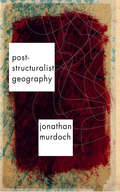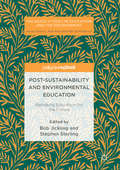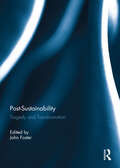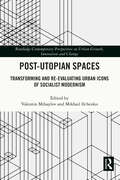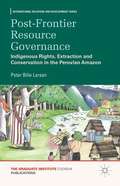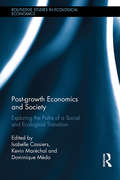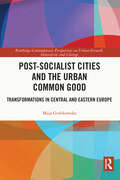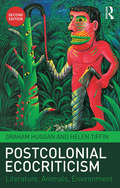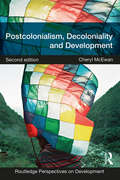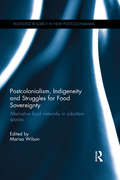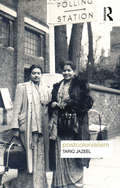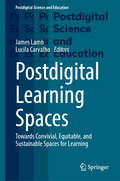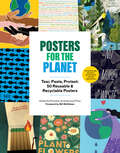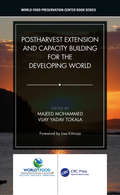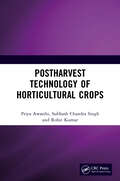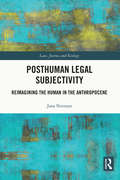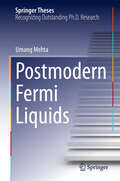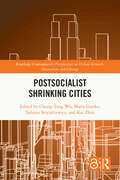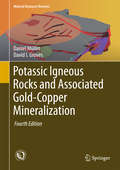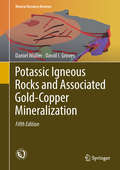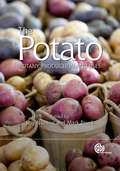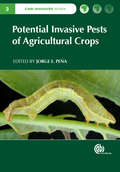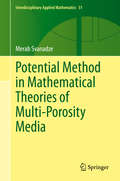- Table View
- List View
Post-Structuralist Geography: A Guide to Relational Space
by Jonathan Murdoch'Murdoch has written a book that is a welcome contribution to an ongoing debate about the nature of geography' - Area (Royal Geographical Society) Post-structuralist Geography is a highly accessible introduction to post-structuralist theory that critically assesses how post-structuralism can be used to study space and place. The text comprises: - a thorough appraisal of the work of key post-structuralist thinkers, including Gilles Deleuze, Michel Foucault, and Bruno Latour - case studies to elucidate, illustrate, and apply the theory - boxed summaries of complex arguments which - with the engaging writing style - provide a clear overview of post-structuralist approaches to the study of space and place. Comprehensive and comprehensible - communicating a new and exciting agenda for human geography - Post-structuralist Geography is the students' essential guide to the theoretical literature.
Post-Sustainability and Environmental Education: Remaking Education For The Future (Palgrave Studies in Education and the Environment)
by Bob Jickling Stephen SterlingThis book provides a critique of over two decades of sustained effort to infuse educational systems with education for sustainable development. Taking to heart the idea that deconstruction is a prelude to reconstruction, this critique leads to discussions about how education can be remade, and respond to the educational imperatives of our time, particularly as they relate to ecological crises and human-nature relationships. It will be of great interest to students and researchers of sociology, education, philosophy and environmental issues.
Post-Sustainability: Tragedy and Transformation
by John FosterThe sustainability discourse and policy paradigm have failed to deliver. In particular, they have failed to avert the dangerously disruptive climate change which is now inevitable. So, if there is still a case for some transformed or revitalised version of sustainability, that case must now surely be made in full acknowledgment of deep-seated paradigm-failure to date. But if we really take ourselves to be living in a post-sustainable world, the issue of ‘what next?’ must be faced, and the hard questions no longer shirked. What options for political and personal action will remain open on a tragically degraded planet? How will economic and community life, political and social leadership and education be different in such a world? What will the geopolitics (of crisis, migration and conflict) look like? Where does widespread denial come from, how might it be overcome, and are there any grounds for hope that don’t rest on it?The urgent challenge now is to confront such questions honestly. This collection of essays by thinkers from a diversity of fields including politics, philosophy, sociology, education and religion, makes a start.This book was originally published as a special issue of Global Discourse.
Post-Utopian Spaces: Transforming and Re-Evaluating Urban Icons of Socialist Modernism (Routledge Contemporary Perspectives on Urban Growth, Innovation and Change)
by Valentin Mihaylov Mikhail IlchenkoFeaturing up-to-date and insightful analyses and comparative case studies from a plethora of countries, this timely book explores ‘ideal’ socialist cities and their transformation under new socio-economic and political conditions after the fall of communism. With contributions from leading scholars in the field, this book prioritises objective scientific knowledge and presents expert rethinking of the historical experience of urban planning in the former socialist countries of Eurasia. It draws on carefully selected examples of iconic cities of socialist modernism, from the post-Soviet space, Central Europe, and the Balkans. The book explores the ongoing transformation of these cities: from uniformed urban environment to chaotic post-modernist planning, from industrialisation to touristification, from deideologisation to making new and still highly contested heritage. Written in an accessible and engaging style, this book will be of interest to students and scholars in urban studies, human geography, sociology, social anthropology, spatial planning, and architectural practice.
Post-frontier Resource Governance
by Peter Bille LarsenThe 20th century involved an unprecedented scramble for resources reaching the most remote corners of the world. Simultaneously, a quiet revolution has taken place with environmental protection, land and community rights regimes gradually taking hold, albeit unevenly, across the global South. Institutional topographies and policies have never before appeared as green and socially inclusive, yet co-exist with a deepening socio-environmental crisis. Intensified pressures stand in contrast to,persist, and even thrive under new environmental and social protection measures. The author offers an anthropological analysis of the paradox. Building on the concept of post-frontier governance, he presents a portrayal of the host of new regulatory technologies, practices and institutions that nominally close, yet more accurately characterize and restructure, contemporary resource frontiers. The book examines these arrangements ethnographically in the Peruvian Amazon by focusing on the Y#65533;nesha people and their involvement with the organization of indigenous rights, conservation and protected area planning, logging, and oil development.
Post-growth Economics and Society: Exploring the Paths of a Social and Ecological Transition (Routledge Studies in Ecological Economics)
by Dominique Méda Isabelle Cassiers Kevin MaréchalWe stand on the threshold of a "post-growth" world – one in which the relentless pursuit of economic growth has ceased to constitute a credible societal project. The symptoms that mark the end of an era are clear and incontrovertible: a return to the regularities of the past is illusory. The pursuit of economic growth no longer constitutes a credible societal project for ecological, social, and geopolitical reasons. Edited by an impressive array of experts, this book identifies several areas in which we must fundamentally rethink our societal organisation. They ask what it means to abandon the objective of economic growth; how we can encourage the emergence of other visions to guide society; how global visions and local transition initiatives should be connected; which modes of governance should be associated with the required social and technological innovations. Alongside the necessary respect of ecological limits and equity in distribution, the promotion of autonomy (involving all in the building of socio-political norms) could serve for guidance. The topics addressed over the chapters range from the future of work to the de-commodification of economic relations; the search for new indicators of progress to decentralized modes of governance; and from the circular economy to polycentric transitions. Each contribution brings a unique perspective, a piece of a larger puzzle to be assembled. Post-growth Economics and Society is an important volume to those who study ecological economics, political economy and the environment and society. It invites theorists as much as practitioners to re-explore the roots of our societal goals and play an active role in the systemic shift to come.
Post-socialist Cities and the Urban Common Good: Transformations in Central and Eastern Europe (Routledge Contemporary Perspectives on Urban Growth, Innovation and Change)
by Maja GrabkowskaThis book explores the changing approaches to urban common good in Central and Eastern Europe after 1989. The question of common good is fundamental to urban living; however, understanding of the term varies depending on local contexts and conditions, particularly complex in countries with experience of communism. In cities east of the former Iron Curtain, the once ideologically imposed principle of common good became gradually devalued throughout the 20th century due to the lack of citizen agency, only to reappear as a response to the ills of neoliberal capitalism around the 2010s. The book reveals how the idea of urban common good has been reconstructed and practiced in European cities after socialism. It documents the paradigm shift from city as a communal infrastructure to city as a commodity, which lately has been challenged by the approach to city as a commons. These transformations have been traced and analysed within several urban themes: housing, public transport, green infrastructure, public space, urban regeneration, and spatial justice. A special focus is on the changes in the public discourse in Poland and the perspectives of key urban stakeholders in three case-study cities of Gdańsk, Kraków, and Łódź. The findings point to the need for drawing from best practices of the socialist legacy, with its celebration of the common. At the same time, they call for learning from the mistakes of the recent past, in which the opportunity for citizen empowerment has been unseized. The book is intended for researchers, academics, and postgraduates, as well as practitioners and anyone interested in rediscovering the inherent potential of urban commonality. It will appeal to those working in human geography, spatial planning, and other areas of urban studies.
Postcolonial Ecocriticism: Literature, Animals, Environment
by Graham Huggan Helen TiffinThis second edition of Postcolonial Ecocriticism, a book foundational for its field, has been updated to consider recent developments in the area such as environmental humanities and animal studies. Graham Huggan and Helen Tiffin examine transverse relations between humans, animals and the environment across a wide range of postcolonial literary texts and also address key issues such as global warming, food security, human over-population in the context of animal extinction, queer ecology, and the connections between postcolonial and disability theory. Considering the postcolonial first from an environmental and then a zoocritical perspective, the book looks at: Narratives of development in postcolonial writing Entitlement, belonging and the pastoral Colonial 'asset stripping' and the Christian mission The politics of eating and the representation of cannibalism Animality and spirituality Sentimentality and anthropomorphism The changing place of humans and animals in a 'posthuman' world. With a new preface written specifically for this edition and an annotated list of suggestions for further reading, Postcolonial Ecocriticism offers a comprehensive and fully up-to-date introduction to a rapidly expanding field.
Postcolonialism, Decoloniality and Development (Routledge Perspectives on Development)
by Cheryl McEwanPostcolonialism, Decoloniality and Development is a comprehensive revision of Postcolonialism and Development (2009) that explains, reviews and critically evaluates recent debates about postcolonial and decolonial approaches and their implications for development studies. By outlining contemporary theoretical debates and examining their implications for how the developing world is thought about, written about and engaged with in policy terms, this book unpacks the difficult, complex and important aspects of the relationships between postcolonial theory, decoloniality and development studies. The book focuses on the importance of development discourses, the relationship between development knowledge and power, and agency within development. It includes significant new material exploring the significance of postcolonial approaches to understanding development in the context of rapid global change and the dissonances and interconnections between postcolonial theory and decolonial politics. It includes a new chapter on postcolonial theory, development and the Anthropocene that considers the challenges posed by the current global environmental crisis to both postcolonial theory and ideas of development. The book sets out an original and timely agenda for exploring the intersections between postcolonialism, decolonialism and development and provides an outline for a coherent and reinvigorated project of postcolonial development studies. Engaging with new and emerging debates in the fields of postcolonialism and development, and illustrating these through current issues, the book continues to set agendas for diverse scholars working in the fields of development studies, geography, anthropology, politics, cultural studies and history.
Postcolonialism, Indigeneity and Struggles for Food Sovereignty: Alternative food networks in subaltern spaces (Routledge Research in New Postcolonialisms)
by Marisa WilsonThis book explores connections between activist debates about food sovereignty and academic debates about alternative food networks. The ethnographic case studies demonstrate how divergent histories and geographies of people-in-place open up or close off possibilities for alternative/sovereign food spaces, illustrating the globally uneven and varied development of industrial capitalist food networks and of everyday forms of subversion and accommodation. How, for example, do relations between alternative food networks and mainstream industrial capitalist food networks differ in places with contrasting histories of land appropriation, trade, governance and consumer identities to those in Europe and non-indigenous spaces of New Zealand or the United States? How do indigenous populations negotiate between maintaining a sense of moral connectedness to their agri- and acqua-cultural landscapes and subverting, or indeed appropriating, industrial capitalist approaches to food? By delving into the histories, geographies and everyday worlds of (post)colonial peoples, the book shows how colonial power relations of the past and present create more opportunities for some alternative producer–consumer and state–market–civil society relations than others.
Postcolonialism: Nature, Environment And The Postcolonial Geographies Of Sri Lankan Nationhood (Key Ideas in Geography #12)
by Tariq JazeelPostcolonialism is a book that examines the influence of postcolonial theory in critical geographical thought and scholarship. Aimed at advanced-level students and researchers, the book is a lively, stimulating and relevant introduction to ‘postcolonial geography’ that elaborates on the critical interventions in social, cultural and political life this important subfield is poised to make. The book is structured around three intersecting parts – Spaces, 'Identity'/hybridity, Knowledge – that broadly follow the trajectory of postcolonial studies since the late 1970s. It comprises ten main chapters, each of which is situated at the intersections of postcolonialism and critical human geography. In doing so, Postcolonialism develops three key arguments. First, that postcolonialism is best conceived as an intellectually creative and practical set of methodologies or approaches for critically engaging existing manifestations of power and exclusion in everyday life and in taken-as-given spaces. Second, that postcolonialism is, at its core, concerned with the politics of representation, both in terms of how people and space are represented, but also the politics surrounding who is able to represent themselves and on what/whose terms. Third, the book argues that postcolonialism itself is an inherently geographical intellectual enterprise, despite its origins in literary theory. In developing these arguments and addressing a series of relevant and international case studies and examples throughout, Postcolonialism not only demonstrates the importance of postcolonial theory to the contemporary critical geographical imagination. It also argues that geographers have much to offer to continued theorizations and workings of postcolonial theory, politics and intellectual debates going forward. This is a book that brings critical analyses of the continued and omnipresent legacies of colonialism and imperialism to the heart of human geography, but also one that returns an avowedly critical geographical disposition to the core of interdisciplinary postcolonial studies.
Postdigital Learning Spaces: Towards Convivial, Equitable, and Sustainable Spaces for Learning (Postdigital Science and Education)
by Lucila Carvalho James LambThis edited collection brings empirical, theoretical, and conceptual work related to learning spaces and practices that draw on the convergence of nature, humans, and the digital, in order to contribute to transformative action (that is likely) to effect change. The book asks, how can learning spaces be more convivial, equitable or sustainable, considering the challenges our world is facing? With a view to extending the reach and impact of existing postdigital scholarship, the book explores learning spaces beyond higher education. This includes learning spaces associated with cultural heritage, creative arts, refugees and displaced persons, schools, outdoor education, the city, and elsewhere.
Posters for the Planet: Tear, Paste, Protest: 50 Reusable and Recyclable Posters
by Princeton Architectural PressThese 50 full-color tear-out posters feature original artwork that conveys the urgent need to take action to combat climate change. Whether you're an activist, a student, or are looking for the perfect environmental gift, this collection of original posters from a series of international artists and designers is sure to inspire change. In a time when our environmental future is uncertain, natural disasters are becoming more frequent, and the window to avoid further irreversible climate damage is closing, collective action is essential. Compiled from an open call (design poured in from all over the world), 50 winning designs were selected from more than 800 entries. A global problem requires a global solution. Historically, posters have been one of the most common mediums of communication for dissent and social change, and the 50 tear-out posters in Posters for the Planet allow you to voice the importance of taking action now. Printed on 11-by-17-inch FSC paper, each of the perforated posters features a unique design that you can proudly display or distribute to convey how crucial it is to act responsibly, fight climate change through environmental policy, and create a bright future for ourselves and future generations. Partial proceeds of the sale of this book will be donated to Indigenous Environmental Network, Clean Air Task Force, and Coalition for Rainforest Nations.
Postharvest Extension and Capacity Building for the Developing World (World Food Preservation Center Book Series)
by Majeed Mohammed and Vijay Yadav TokalaIt is estimated that around 1.3 billion tons per year of food produced for human consumption, which is about one-third of all food produced, is either lost or wasted globally. Reduction of the postharvest losses is being considered as one of the sustainable ways to ensure world food security. Postharvest Extension and Capacity Building for the Developing World provides information on postharvest extension/outreach programs, capacity building, and practical methodologies for postharvest extension professionals and food science teachers, food processing trainers, and outreach specialists who work in the field. The book provides information on training of postharvest trainers, food loss assessment methods, capacity building in universities and agro-industry, distance education methods, models for cost effective postharvest/food processing extension work, success stories, and lessons learned from past projects and programs. The book is divided into four sections. Section I explains postharvest loss assessments methods, Section II is on capacity building, and Sections III and IV focus on training and postharvest extension models. Food loss assessment methodologies are highlighted from several high-profile institutions and it is envisioned that researchers and postharvest extension personnel will benefit from the development and field testing of a hybrid methodology, incorporating the strengths and utilizing the best practices from each of the methodologies in current use. Chapters cover postharvest extension work and capacity building in a wide range of regions.
Postharvest Technology of Horticultural Crops
by Rohit Kumar Subhash Chandra Singh Priya AwasthiThis book is an informative introduction to the post-harvest technology of horticultural crops, and their conservation and management. The different post-harvest handling operations including storage aspects are also covered. Innovative processing technologies like high-pressure processing, irradiation, cold plasma technique and ohmic heating are also discussed in the book.
Posthuman Legal Subjectivity: Reimagining the Human in the Anthropocene (Law, Justice and Ecology)
by Jana NormanThis book provides a reimagining of how Western law and legal theory structures the human–earth relationship. As a complement to contemporary efforts to establish rights of nature and non-human legal personhood, this book focuses on the other subject in the human–earth relationship: the human. Critical ecological feminism exposes the dualistic nature of the ideal human legal subject as a key driver in the dynamic of instrumentalism that characterises the human–earth relationship in Western culture. This book draws on conceptual fields associated with the new sciences, including new materialism, posthuman critical theory and Big History, to demonstrate that the naturalised hierarchy of humans over nature in the Western social imaginary is anything but natural. It then sets about constructing a counternarrative. The proposed ‘Cosmic Person’ as alternative, non-dualised human legal subject forges a pathway for transforming the Western cultural understanding of the human–earth relationship from mastery and control to ideal co-habitation. Finally, the book details a case study, highlighting the practical application of the proposed reconceptualisation of the human legal subject to contemporary environmental issues. This original and important analysis of the legal status of the human in the Anthropocene will be of great interest to those working in legal theory, jurisprudence, environmental law and the environmental humanities; as well as those with relevant interests in gender studies, cultural studies, feminist theory, critical theory and philosophy.
Postmodern Fermi Liquids (Springer Theses)
by Umang MehtaThis thesis develops a new approach to Fermi liquids based on the mathematical formalism of coadjoint orbits, allowing Landau’s Fermi liquid theory to be recast in a simple and elegant way as a field theory. The theory of Fermi liquids is a cornerstone of condensed matter physics with many applications, but efforts to cast Landau’s Fermi liquid theory in the modern language of effective field theory suffer from technical and conceptual difficulties: the Fermi surface seems to defy a simple effective field theory description. This thesis reviews the recently-developed formalism for Fermi liquids that exploits an underlying structure described by the group of canonical transformations of a single particle phase space. This infinite-dimensional group governs the space of states of zero temperature Fermi liquids and allows one to write down a nonlinear, bosonized action that reproduces Landau’s kinetic theory in the classical limit. The thesis then describes how that Fermi liquid theory can essentially be thought of as a non-trivial representation of the Lie group of canonical transformations, bringing it within the fold of effective theories in many-body physics whose structure is determined by symmetries. After analyzing the benefits and limitations of this geometric formalism, pathways to extensions of the formalism to include superconducting and magnetic phases, as well as applications to the problem of non-Fermi liquids, are discussed. The thesis begins with a pedagogical review of Fermi liquid theory and concludes with a discussion on possible future directions for Fermi surface physics, and more broadly, the usefulness of diffeomorphism groups in condensed matter physics.
Postsocialist Shrinking Cities (Routledge Contemporary Perspectives on Urban Growth, Innovation and Change)
by Chung-Tong WuThis book provides a comparative analysis of shrinking cities in a broad range of postsocialist countries within the so-called Global East, a liminal space between North and South. While shrinking cities have received increased scholarly attention in the past decades, theoretical, and empirical research has remained predominantly centered on the Global North. This volume brings to the fore a range of new perspectives on urban shrinkage, identifying commonalities, differences, and policy experiences across a very diverse and vivid region with its various legacies and contemporary controversial developments. With chapters written by leading experts in the field, insider views assist in decolonizing urban theory. Specifically, the book includes chapters on shrinking cities in China, Russia, and postsocialist Europe, presenting comparative discussions within countries and crossnational cases on theoretical and policy implications. The book will be of interest to students and scholars researching urban studies, urban geography, urban planning, urban politics and policy, urban sociology, and urban development.
Potassic Igneous Rocks and Associated Gold-Copper Mineralization
by Daniel Müller David I. GrovesThis book reviews the geochemical and petrological characteristics of potassic igneous rock complexes, and investigates the different tectonic settings in which these rocks occur. The authors provide an overview and classification of these rocks and elucidate the geochemical differences between barren and mineralized potassic igneous complexes. High-K rocks host a number of epithermal gold and porphyry copper-gold deposits. In recent years, there has also been growing recognition of an association of such rocks with iron-oxide copper-gold (IOCG) deposits, intrusion-related gold deposits (IRGDs) and possibly even Carlin-type gold deposits. This book is not only relevant to academic petrologists working on alkaline rocks, but also to exploration geologists prospecting for epithermal gold and/or porphyry copper-gold deposits in modern and ancient terrains. This fourth, updated and expanded edition incorporates new data and references from Africa, Australia, Brazil, China, Greece, Iran, Mongolia, North America, Russia and Turkey, including new maps and sections and new color plates of high-grade gold-copper ore from major deposits hosted by potassic igneous rocks.
Potassic Igneous Rocks and Associated Gold-Copper Mineralization: With Particular Reference To Western North America (Mineral Resource Reviews #Vol. 56)
by Daniel Müller David I. GrovesThis book reviews the geochemical and petrological characteristics of potassic igneous rock complexes, and investigates the various tectonic settings in which these rocks occur. The authors provide an overview and classification of these rocks and elucidate the geochemical differences between barren and mineralized potassic igneous complexes. High-K rocks are genetically associated with a number of epithermal gold and porphyry copper-gold deposits. In recent years, there has also been growing recognition of an association of such rocks with iron-oxide copper-gold (IOCG) deposits, intrusion-related gold deposits (IRGDs) and Carlin-type gold deposits. This fifth updated and expanded edition incorporates new data and references from world-class copper and gold deposits worldwide. It also includes the latest publications on the petrogenesis of high-K magmatism and related mineral deposits. Numerous new representative ore photographs of the mineral deposits described are also included in the new edition. As such, the book offers a valuable guide not only for academic petrologists working on alkaline rocks, but also for exploration geologists prospecting for epithermal gold and/or porphyry copper-gold deposits in modern and ancient terrains.
Potato: Botany Production And Uses
by Mark Taylor Roger Jones Howard Davies William Kirk Tim Waters Chuck Brown Wesley Everman Jennifer Bond Robert Robert Ian Burke Carrie Wohleb Albert Abbott Loretta Mikitzel Roy Navarre Kaiyun Xie Mark Stalham A Bussan Bjorn Kloosterman Paul Bethke David Wattie Richard Veilleux Rich Novy Roland van den Berg Mark Pavek Andy Jensen Vivian BlokPotatoes are a staple crop around the world. Covering all aspects of botany, production and uses, this book presents a comprehensive discussion of the most important topics for potato researchers and professionals. It assesses the latest research on plant growth such as tuber development, water use and seed production, covers all aspects of pest management and reviews postharvest issues such as storage, global markets, and of course, nutritional value and flavour.
Potato: Botany, Production and Uses (Botany, Production and Uses)
by Mark Taylor Roger Jones Howard Davies William Kirk Tim Waters Chuck Brown Wesley Everman Jennifer Bond Robert Robert Ian Burke Carrie Wohleb Albert Abbott Loretta Mikitzel Kaiyun Xie Mark Stalham A Bussan Bjorn Kloosterman Paul Bethke David Wattie Richard Veilleux Rich Novy Roland van den Berg Andy Jensen Vivian BlokPotatoes are a staple crop around the world. Covering all aspects of botany, production and uses, this book presents a comprehensive discussion of the most important topics for potato researchers and professionals. It assesses the latest research on plant growth such as tuber development, water use and seed production, covers all aspects of pest management and reviews postharvest issues such as storage, global markets, and of course, nutritional value and flavour.
Potential Invasive Pests of Agricultural Crops
by Mark Hoddle V Satarkar Jose Carlos Rodrigues Crebio Avila J Alvarez Andrea Birke Jorge Peña Jose Roberto Parra Denise Navia Juliet Goldsmith Anne Roy Takumasa Kondo Kenneth Storey Aldo Malavasi Amy Roda J. Ramon Valiente Mark Culik Ana Isabel Gonzalez Michael Hennessey Jose Romeno Faleiro Greg Hodges Juli Gould Alvaro Castañeda Vildózola Gregory Evans Cal Welbourn David Bartels Alberto Urbaneja Ana Diaz Montilla Robert Haack Raymond GagneInvasive arthropods cause significant damage in agricultural crops and natural environments across the globe. Potentially threatened regions need to be prepared to prevent new pests from becoming established. Therefore, information on pest identity, host range, geographical distribution, biology, tools for detection and identification are all essential to researchers and regulatory personnel. This book focuses on the most recent invasive pests of agricultural crops in temperate subtropical and tropical areas and on potential invaders, discussing their spread, biology and control.
Potential Invasive Pests of Agricultural Crops
by Mark Hoddle V Satarkar Jose Carlos Rodrigues Crebio Avila J Alvarez Andrea Birke Jose Roberto Parra Denise Navia Juliet Goldsmith Anne Roy Takumasa Kondo Kenneth Storey Aldo Malavasi Amy Roda J. Ramon Valiente Mark Culik Ana Isabel Gonzalez Michael Hennessey Jose Romeno Faleiro Greg Hodges Juli Gould Alvaro Castañeda Vildózola Gregory Evans Cal Welbourn David Bartels Alberto Urbaneja Ana Diaz Montilla Robert Haack Raymond GagneInvasive arthropods cause significant damage in agricultural crops and natural environments across the globe. Potentially threatened regions need to be prepared to prevent new pests from becoming established. Therefore, information on pest identity, host range, geographical distribution, biology, tools for detection and identification are all essential to researchers and regulatory personnel. This book focuses on the most recent invasive pests of agricultural crops in temperate subtropical and tropical areas and on potential invaders, discussing their spread, biology and control.
Potential Method in Mathematical Theories of Multi-Porosity Media (Interdisciplinary Applied Mathematics #51)
by Merab SvanadzeThis monograph explores the application of the potential method to three-dimensional problems of the mathematical theories of elasticity and thermoelasticity for multi-porosity materials. These models offer several new possibilities for the study of important problems in engineering and mechanics involving multi-porosity materials, including geological materials (e.g., oil, gas, and geothermal reservoirs); manufactured porous materials (e.g., ceramics and pressed powders); and biomaterials (e.g., bone and the human brain). Proceeding from basic to more advanced material, the first part of the book begins with fundamental solutions in elasticity, followed by Galerkin-type solutions and Green’s formulae in elasticity and problems of steady vibrations, quasi-static, and pseudo-oscillations for multi-porosity materials. The next part follows a similar format for thermoelasticity, concluding with a chapter on problems of heat conduction for rigid bodies. The final chapter then presents a number of open research problems to which the results presented here can be applied. All results discussed by the author have not been published previously and offer new insights into these models.Potential Method in Mathematical Theories of Multi-Porosity Media will be a valuable resource for applied mathematicians, mechanical, civil, and aerospace engineers, and researchers studying continuum mechanics. Readers should be knowledgeable in classical theories of elasticity and thermoelasticity.
